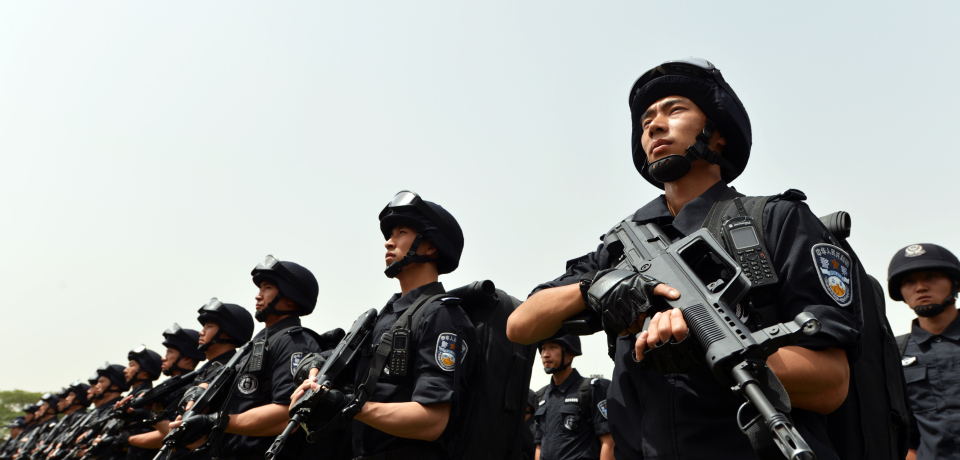As China tries to align its controversial fight against terrorism in Xinjiang with global counterterrorism initiatives, Human Rights Watch’s China director Sophie Richardson urges international government stakeholders to make the observance of international human rights standards a requirement for Beijing’s collaboration. From Foreign Policy:
[…W]hether Beijing genuinely espouses the [White House Summit on Countering Violent Extremism]’s stated goal of addressing the root causes of violent extremism — or simply wants to appear cooperative abroad while pursuing ominously repressive and counterproductive policies at home — is less clear. For example, that the prominent Xinjiang economist Ilham Tohti was sentenced on Sept. 2014 to a life sentence on the baseless charges of “separatism” suggests Beijing’s agenda has little to do with upholding human rights.
[…] Yes, some Uighurs have recently carried out violent attacks. In March 2014, a group of assailants attacked and killed 29 people at the train station in Kunming, the capital of Yunnan province in south China. In April, as President Xi Jinping finished a tour of Xinjiang, an attack on the train station of the region’s capital Urumqi, killed three people and wounded nearly 80. The following month, bomb blasts in an Urumqi market killed more than 30 people and wounded more than 90, according to Chinese state media reports. Chinese diplomats exhorted other governments to label these incidents “terrorism” — a term it fails to clearly define.
[…] How should governments use Beijing’s willingness to talk about terrorism without legitimizing its abusive approach? At a minimum, further bilateral dialogues should only continue if they are a useful vehicle for engaging China on the relationship between human rights violations and terrorism; no government should agree to increase information-sharing, training, or other cooperation with China until the draft law is withdrawn and rewritten in accordance with international standards. Even if that does not happen, governments should urge Beijing to review all terrorism convictions from the past decade for due process violations, and review all terrorism-related policies including use of lethal force. They should call for the immediate release of Tohti, his students who are detained, and all others imprisoned for exercising their right to peaceful expression. And they should recommit to assisting Uighur refugees abroad fleeing Beijing’s ever-lengthening arm. Working with China without pressing for these changes will undermine rather than improve counterterrorism efforts. […] [Source]
Last month, Richardson criticized China’s draft counterterrorism law as “little more than a license to commit human rights abuses.” In the above blockquoted article, she mentions that the National People’s Congress will likely pass the law next month. Following initial criticism of the draft law, legal scholar Zunyou Zhou took a close look at the definition of terrorism that it contained, compared it to global definitions of the term, and finally called upon Chinese legislators to overhaul the draft definition before passing it into law:
[…] According to Article 104 of the draft law, “terrorism” means “any thought, speech, or activity that, by means of violence, sabotage, or threat, aims to generate social panic, influence national policy-making, create ethnic hatred, subvert state power, or split the state.”
Article 104 goes on to flesh out the keyword “terrorist activity” as referred to in the “terrorism” definition. Accordingly, “terrorist activities” include (a) propagating, inciting, or instigating terrorism; or (b) forming, leading or participating in an terrorist organization; or (c) organizing, plotting, or implementing a terrorist action; or (d) supporting, assisting, or facilitating a terrorist organization or individual through the provision of information, funds, material, equipment, technologies or venues; or (e) other terrorist activities.
Further, Article 104 also defines “a terrorist organization” and “a terrorist.” Hence, a terrorist organization refers to a relatively stable criminal group, of at least three members, established for the purpose of carrying out terrorist activities; a terrorist is either a member of a terrorist organization or a person who carries out terrorist activities.
[…] Before passing the anti-terrorism law, Chinese law-makers need to overhaul the definition of terrorism to guarantee that terrorism is described as a serious crime with an additional quality that calls both for international concern and harsh treatment. [Source]
For a broader analysis of nebulous and historically-shifting global definitions of terrorism, listen to last week’s episode of On the Media, which devoted several segments to the topic:
Update 2/25/2014, 12:42 PST: A report from Xinhua notes that the draft law has been changed, no longer including “thought” in the definition of terrorism, and now containing limitations to security authorities’ jurisdiction as a means to protect citizens’ rights:
According to the new draft, terrorism is defined as “any speech or activity that, by means of violence, sabotage or threat, generates social panic, undermines public security, and menaces government organs and international organizations.”
The definition of terrorism in an earlier draft, submitted in October last year, also included “thoughts” in addition to “speeches and activities,” but these were deleted “for the sake of accuracy and applicability,” according to Su.
[…] It also sought to strike a balance between combating extremism and rights protection.
In particular, security authorities’ access to citizens’ information via telecom and Internet technology now must undergo “strict approval procedures,” and information obtained in accordance with the draft law could only be used for the purpose of counterterrorism operations, the draft stressed. [Source]








